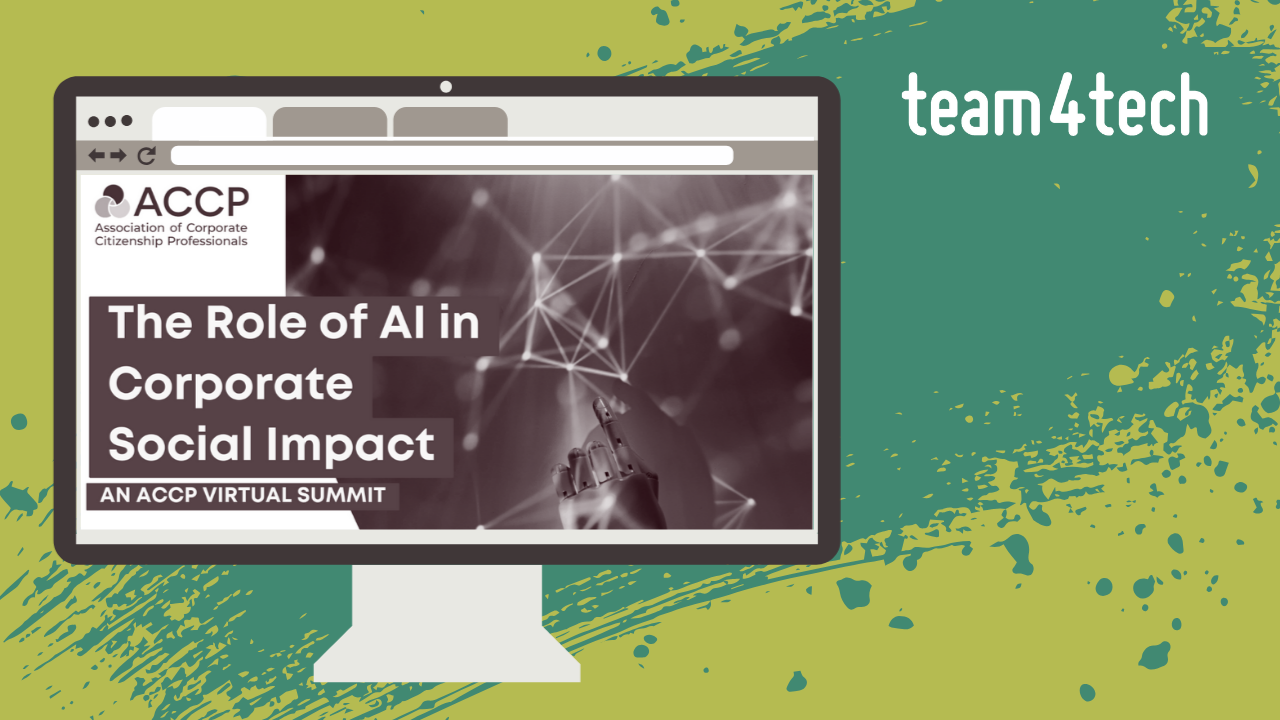Written by Team4Tech Chief Partnerships Officer, Elizabeth Schwan-Rosenwald
Questions looking to be explored were the main focus of ACCP’s virtual summit: “The Role of AI in Corporate Social Impact.” The exploding use of AI is new, and all of us, whether corporate social impact professionals or nonprofit executives, are looking for answers and shared learnings. Working at the intersection of nonprofits and corporations for the past two decades, it’s long been clear to me that nonprofits need investments in technology to grow, adapt, build capacity, and innovate. Given the rapidly changing technology landscape, this need for investment is clearer than ever. Attendees at ACCP’s virtual summit agreed. Discussions highlighted the immediacy of that need with a recognition of the rapid pace at which nonprofits must adapt.
For many corporate social responsibility professionals, the challenge wasn’t deciding whether to assist nonprofits in adapting and leveraging AI, but determining how to provide that help effectively. Nonprofits continue to face challenges in assessing their AI needs and identifying the most valuable resources —whether talent, tools, or funding—that could help them harness AI effectively to support their growth and impact. Without that clarity, it can be challenging for companies to know where to invest and how to support technological growth.
Team4Tech has built a suite of resources designed to address these challenges and build new avenues for effective collaboration between corporate professionals and nonprofits. Accessible as part of our online Community of Practice platform, our trainings and resources guide nonprofits in building digital skills with a specific focus on AI. Our Community of Practice also provides skilled volunteers with opportunities to support nonprofit technological growth. Some of our programs include:
- Introduction to AI: This is a capacity-building course where nonprofits will learn to define AI, differentiate between functionality-based and capability-based classifications of AI, analyze how AI can enhance education equity, evaluate the role of AI in reducing digital education gaps, identify ethical challenges associated with AI, and discuss the impact of AI on the future workforce and the importance of preparing learners for these changes.
- Consulting Calls: Every month, skilled volunteers connect with nonprofits to discuss some of the biggest tech challenges facing them and brainstorm possible solutions. These one-hour calls focus on specific technological challenges and offer roadmaps for the next steps in problem-solving.
- Digital Literacy and Digital Fluency Toolkits: These comprehensive resources are designed to enable nonprofits to thrive in the digital space and encourage these skills in their learners. These toolkits offer structured courses that cover the essentials of digital literacy and digital fluency, as well as practical strategies for leveraging technology, interactive modules, and case studies, equipping nonprofit leaders with the knowledge to harness the power of digital tools effectively.
- Micro-Matching: Skilled volunteers work with nonprofits over 12 – 14 hours on templated scopes of work to deliver new resources that address technological capacity gaps.
It comes down to capacity building. With two-thirds of nonprofit leaders sharing that they don’t know how to use AI in their organization, the need for investments in tech infrastructure is instrumental in ensuring that nonprofits aren’t left behind in AI advancements. The ACCP AI virtual summit highlighted these pressing needs and the value of strengthening AI capacity within the nonprofit sector. Team4Tech’s programs show that we can enable these organizations to thrive in this rapidly evolving landscape with training, educational resources, and collaboration between skilled corporate professionals and nonprofits. By building deeper cross-sector partnerships that get at the real challenges nonprofits face, we can ensure that nonprofits not only adapt but also innovate, driving impactful change through the responsible and effective use of AI. Together, we can shape a future where technology serves as a powerful catalyst for social good.
